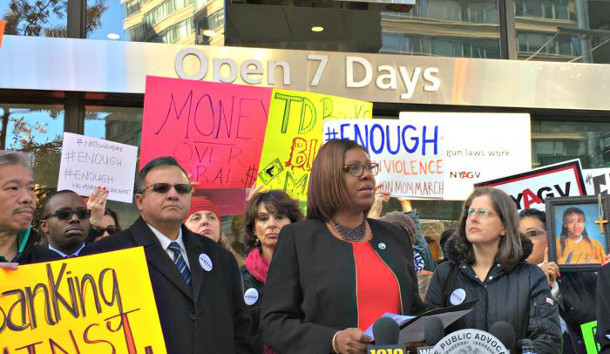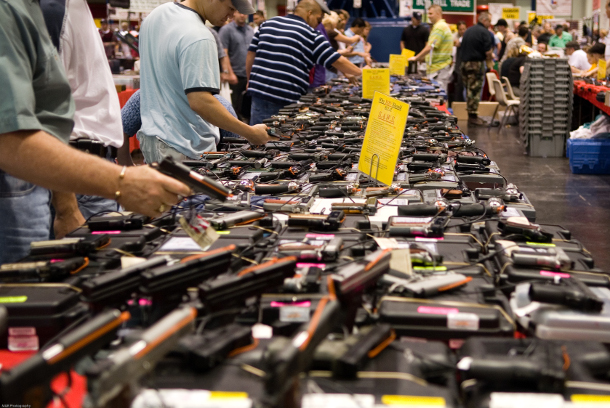In the early days of 2016, gun rights and regulation have dominated America's political discourse. An armed standoff continues in Oregon, President Barack Obama tearfully called for new gun safety measures, and Republican presidential candidates swiftly vowed to repeal them.
In the investment world, developments like these have a surprising side effect: in America, at least, they boost gun sales. Days before Obama announced his series of actions to expand background checks and enforcement, major manufacturers' stock value saw a steep increase. That jump closely followed a larger sales spike in the wake of the San Bernardino massacre in December.
In spite of these trends, some observers say the new year already presents a rising threat to the firearm industry's bottom line. A chorus of critics including mayors, universities, public advocates and rapper Snoop Dogg are calling on pension funds, banks and investors across America to stop funding weapons.
Arms divestment isn't exactly new -- anti-war and anti-nuclear organizers of the last two decades have made attempts to move money away from weapons dealers. But a new generation of social media-driven campaigns has put America's domestic handgun, automatic and semi-automatic gun industry in their crosshairs, taking cues from other successful movements.
For example, the U.S. advocacy coalition Campaign to Unload has built momentum across 50 gun control organizations, following in the footsteps of tobacco and fossil fuel divestment campaigns before it. The group's latest campaign takes aim at about $1.9 billion in employee mutual funds invested in three publicly traded U.S. gun and ammunition manufacturers: Sturm, Ruger & Co, Smith & Wesson and Olin. It has also worked with University of California students to turn the school's $90-billion endowment gun-free.
New York's divestment giants
But the forefront of America's gun divestment push appears to be in New York City, where leaders and advocates boast a record-winning streak.
"I call on all government pension funds in New York City and across the country to divest immediately from funds that include assault weapon manufacturers," Mayor Bill de Blasio said following the San Bernardino shooting. He followed up last Wednesday with a resolution asking the city's police pension fund to take a closer look at gun divestment.
City employees' and teachers' pensions -- two of five NYC retirement pools -- already dropped gun manufacturers like Smith & Wesson and Sturm, Ruger & Co. following the Sandy Hook school shooting in 2012. New York public advocate Letitia James took another step in 2015, asking the city workers' pension fund to withdraw holdings in gun retailers like Walmart, Cabela's and Big 5 as well.
James' resolution to begin divestment proceedings was passed in summer 2015. "Our public money must not be invested in companies that fundamentally undermine our public safety," she wrote in a statement following the vote. "We need to study the potential consequences and risks of continuing to own equity and fixed income holdings in gun retailers, whose weapons and ammunition reach the streets, towns and cities across our country."
Since then, James has taken a more targeted approach in cutting off funds to gun makers, focusing on one Canadian financial institution. She is now petitioning TD Bank to stop lending to Smith & Wesson, one of the largest weapons manufacturers in the world.

"It was Smith & Wesson guns used in the San Bernardino massacre, the Umpqua College shooting and the Aurora movie theatre shooting," James said in an email interview last week. The Toronto-headquartered bank loaned Smith & Wesson $280 million last summer. According to the Smith & Wesson's own financial forecast, the loan represents just under half the company's net sales.
So far, TD Bank has not responded to James' calls, but the watchdog shows no signs of letting up. "Smith & Wesson and TD Bank are where we've begun," said James. "We are continuing to explore other financial institutions and other gun manufacturers."
Canada funds guns, too
Canadians may feel safe from the U.S.'s deadly mass shooting rates, but weapons divestment advocates say our own pension funds, mutual funds and investment portfolios are likely to include gun and military manufacturers, too.
According to Richard Sanders, coordinator for the Coalition to Oppose the Arms Trade, the Canada Pension Plan invests in dozens of domestic and foreign military companies. Sanders said that includes $3 million invested in Sturm, Ruger & Co, a U.S. manufacturer that produces dozens of varieties of weapons, including semi-automatic rifles and semi-automatic pistols. CPP does not invest in Smith & Wesson.
Yet north of the border, gun divestment hasn't put down roots the way it has in New York and across America. Most recently, the Canadian Federation of Students at the University of Toronto raised an "ethical divestment" motion including war and weapons manufacture this year, to be voted on by the student union later this month.
Are these the rumblings of a movement ready to take off? Not quite, say ethical investors. New clients don't often name guns among their first divestment priority, they say -- especially not in Canada.
Instead, Donna Morton, director of business strategy at Principium Investments based out of Colorado sees weapons manufacture as just one layer of a more holistic divestment strategy. "We describe it as moving money from harm to healing," says Morton. That means no weapons, mining or chemical companies, but it also means choosing investments with a lens for gender, diversity and labour rights.
Morton says her firm attracts clients predominantly because of fossil fuel divestment interest. She also sees Canada's market as a challenging environment to drop weapons holdings -- the market is dependent on a small number of big players rather than an abundance of innovators and disruptors.
Still, following Obama's speech that invoked Martin Luther King Jr. while reframing the gun debate as a public health issue, Morton says weapons investment is under the microscope more than ever before. "Guns are losing ground -- I believe that," she said. ![]()
Read more: Rights + Justice, Politics
















Tyee Commenting Guidelines
Comments that violate guidelines risk being deleted, and violations may result in a temporary or permanent user ban. Maintain the spirit of good conversation to stay in the discussion.
*Please note The Tyee is not a forum for spreading misinformation about COVID-19, denying its existence or minimizing its risk to public health.
Do:
Do not: